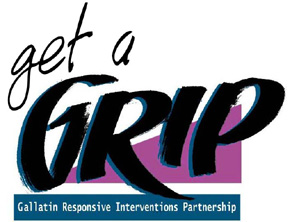|
|
|
|

|
When are fun and games anything but?
Get a GRIP! |
Gallatin Responsive Interventions Partnership (GRIP)
|
|
|
|
June 2006
Hospital Detox: A crisis in care
|

Still swimming upstream. . .
But in good company |
In this issue:
More about GRIP
|
|
From
Jenna |
Dear Reader:
At GRIP we're still swimming upstream against how the community shows up
around alcohol. We do that through researching and reporting on issues
like the pressure detox puts on emergency services in Gallatin County.
We did that in April by hosting the 3rd Annual Swimming Upstream Awards.
Each year our award ceremony becomes more rich, as people get a better sense of
what it is we're gathering to celebrate. Often, many of us working in social service
agencies feel like we're slogging away with our noses to the grindstone, all alone, in
a community that rarely appreciates our efforts. The evening gave us a chance to
both celebrate that hard work, and to raise our heads, look around, and realize that
we really aren't in this all alone. The room was filled with people who care about
how alcohol misuse and alcoholism rob our community of vibrancy, creativity and
authenticity.
By early July we will have posted a sample time line and other details about our
Swimming
Upstream Awards to the MAhP website -- We hope other communities will
pick up
this idea and create a statewide movement!
Sincerely,
Jenna Caplette
GRIP Project Marketing Consultant (and web page woman)
Shaun Phoenix. GRIP Project Coordinator
|
|
Hospital Detox: A crisis in care
by Jenna Caplette |
In detox, �. . . we give ourselves the chance we�ve always deserved.�
Detoxing from alcohol abuse can and does kill people. It�s a medical issue and needs
to be handled carefully. Just the same, there are better options than those
available in Gallatin County, where when someone wants or needs to �detox� their
only immediate option is to arrive at Bozeman Deaconess Hospital, probably by
presenting themselves at the emergency room.
Vickie Groeneweg, head of Emergency Room Services at BDH says that though in an
average month the emergency room might admit only one detox patient, they will
also admit about forty alcohol poisoning patients. To get their blood-alcohol level
down to the level where they can be discharged, thirty-two of those forty will stay
in the ER for more than eight hours.
�To put that in perspective,� she says, �we don�t have 40 diabetics in a month. And
we have maybe forty admissions for chest pains a month.
Other patients with alcohol-related health concerns are admitted because of an
accident or traffic crash related to drinking. They may have passed out somewhere,
or experienced a seizure from the long term consequences of drinking. They may be
DUI offenders, transported to the hospital for assessment and stabilization.
For
these patients, and those seeking detox, emergency personnel need to find them a
doctor.
Many chronic alcohol abusers no longer have a personal care physician, so they are
assigned the next doctor on the ER call list. When doctors sign on for hospital
priveleges, they agree to to become part of that call list. Most of those calls come
in the middle of the night. If that patient stays in the hospital, the doctor who has
been assigned to them will need to visit them on their rounds, once or twice a day.
If a patient has health complications during their detox process, they can be in the
hospital for up to a week. Doctors typically don�t schedule those rounds out of
office time, so those visits are made before or after office hours. For that extra
work, most detox patients will not be able to pay.
�It�s charity care,� says Dr. Andrea Cady of Bozeman Creek Family Health. Even
when doctors do get reimbursed, �hospital care is not lucrative.� And its not
satisfying work in the sense that working with a long term patient might be. In
addiction-prevention work a physician may feel more empowered to work with a
patient to change their behavior.
Kerry Erickson, Adult Liason Case manager for Alcohol and Drug Services of Gallatin
County, meets with ER detox patients, as well as those admitted for other alcohol-
related issues. After doing a brief drug and alcohol use history, she helps them look
at the consequences of their use. She asks, �What do you want to do about it?� If
they want help, and have insurance, she tries to get them into a program right
way. If not, she works to get them involved with services or support groups that
can help bridge the gap between hospital detox and treatment.
That gap in care creates a significant risk for relapse. Instead, Dr. Cady would like
to see �residential, short-term detox with medical supervision.� That kind of detox
is called Social Detox. In it, Kerry Erickson says, the patients who don�t need acute
care still work with a doctor. �They get medication to help with the withdrawal.
There are counselors to help and personnel who monitor their �meds.�� It doesn�t tie
up an emergency room bed. Its more cost-effective.
Either way, what we need, is to address alcohol misuse and addiction as they
public health crisis they are. Either way, when patients complete the detox
process, they need a readily-available treatment option so that there is no gap in
the continuum of services that best offers the hope of healing.
|
|
Return to the top of
this page
|
Resources & Web Links
General Interest . Health Community . Faith Community |
General Interest
Health Community:
Faith Community:
-
Alcohol Awareness resource. Many people are unaware that alcoholism is a disease.
They are unaware of how treatment for alcoholism works . . . or even unaware
that there is treatment. This faith community bulletin or newsletter insert can be downloaded free by churches,
temples, mosques and other faith groups.
|
GRIP Mission and Goals |
Our Mission:To increase the number of people in Gallatin County getting quality
prevention, intervention and treatment for substance abuse disorders.
Our Goal? To increase the number of community, health, and self- referrals for
substance abuse programs and services in Gallatin County.
|
|
Top
of Page
Visit
GRIP's Home Page
|
|
|